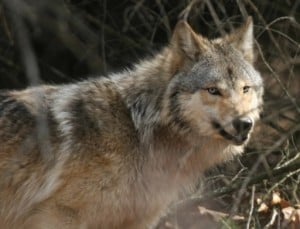
Jayne Belsky
Wolves, such as this one spotted in 2006 near Wisconsin Dells, are being seen more frequently in the state.
16 hours ago • RON SEELY | Wisconsin State Journal
A hunting season for wolves proposed by the
state Department of Natural Resources is likely to face a court
challenge and could land the animal back on the endangered species list,
according to a UW-Madison expert in predator-prey ecology who has spent
12 years studying wolf management in Wisconsin.
The DNR's wolf hunting plan "increases the risk that wolves will be returned to federally endangered status because it proposes untested methods in a very long season in too broad an area of the state," warned Adrian Treves, an associate professor of environmental studies who has surveyed thousands of state residents on the issue.
The Natural Resources Board, which sets policy for the DNR, unanimously approved beginning a process that will lead to wolf hunting rules and a hunting and trapping season on the animal beginning Oct. 15 and running through the end of February, 2013. The board acted on the controversial proposal at its monthly board meeting Wednesday in Madison.
A hunting season on wolves was approved by the state Legislature during its last session. The DNR is now charged with putting the season in place, including determining such details as the number of wolves to be killed.
The five month season would extend through the breeding season. Hunting with dogs, trapping, and hunting at night would be allowed.
The season has the support of many of the state's hunting groups, including the Wisconsin Bear Hunters Association and the Wisconsin Bowhunters Association as well as a number of farm groups such as the Wisconsin Cattlemen's Association and Wisconsin Pork Association.
Support for a wolf season comes from such groups partly because of increasing wolf predation on livestock as wolf numbers climbed toward 1,000 in the state.
"I can just see the wolf pups getting older and looking at my livestock on the other side of the fence. There is an absolute need for controlling the wolf population in this state," said board member William Bruins.
But Treves said rules being considered for the hunt do not target areas where livestock depredations have been most frequent. He said his surveys of thousands of Wisconsin residents have shown that the public supports a wolf hunt only if it targets depredation and if it is designed to sustain the wolf population.
"In short, although this act claims to address depredations, the proposed rules for the hunt suggest that recreation or revenge is the goal," Treves said in a letter to the board.
Treves also said night-time hunting and the long season treat wolves without the respect due a trophy animal.
"The length of the season is similar to the season on rabbits, squirrels, and beavers but longer than coyote trapping. These provisions could generate unsustainable mortality and lead the Fish and Wildlife Service to relist the wolf. Wolves are not an ordinary fur bearer or vermin and should be accorded the status of grand trophy game to be hunted with respect or not at all."
source
The DNR's wolf hunting plan "increases the risk that wolves will be returned to federally endangered status because it proposes untested methods in a very long season in too broad an area of the state," warned Adrian Treves, an associate professor of environmental studies who has surveyed thousands of state residents on the issue.
The Natural Resources Board, which sets policy for the DNR, unanimously approved beginning a process that will lead to wolf hunting rules and a hunting and trapping season on the animal beginning Oct. 15 and running through the end of February, 2013. The board acted on the controversial proposal at its monthly board meeting Wednesday in Madison.
A hunting season on wolves was approved by the state Legislature during its last session. The DNR is now charged with putting the season in place, including determining such details as the number of wolves to be killed.
The five month season would extend through the breeding season. Hunting with dogs, trapping, and hunting at night would be allowed.
The season has the support of many of the state's hunting groups, including the Wisconsin Bear Hunters Association and the Wisconsin Bowhunters Association as well as a number of farm groups such as the Wisconsin Cattlemen's Association and Wisconsin Pork Association.
Support for a wolf season comes from such groups partly because of increasing wolf predation on livestock as wolf numbers climbed toward 1,000 in the state.
"I can just see the wolf pups getting older and looking at my livestock on the other side of the fence. There is an absolute need for controlling the wolf population in this state," said board member William Bruins.
But Treves said rules being considered for the hunt do not target areas where livestock depredations have been most frequent. He said his surveys of thousands of Wisconsin residents have shown that the public supports a wolf hunt only if it targets depredation and if it is designed to sustain the wolf population.
"In short, although this act claims to address depredations, the proposed rules for the hunt suggest that recreation or revenge is the goal," Treves said in a letter to the board.
Treves also said night-time hunting and the long season treat wolves without the respect due a trophy animal.
"The length of the season is similar to the season on rabbits, squirrels, and beavers but longer than coyote trapping. These provisions could generate unsustainable mortality and lead the Fish and Wildlife Service to relist the wolf. Wolves are not an ordinary fur bearer or vermin and should be accorded the status of grand trophy game to be hunted with respect or not at all."
source

No comments:
Post a Comment